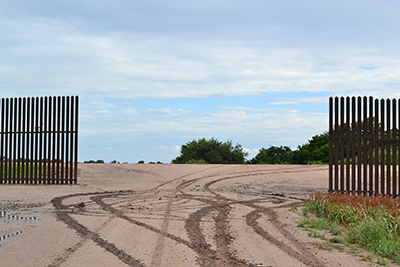The recent news tidbit that President Trump's transition team had asked what money and infrastructure capabilities might be available to begin the promised border wall (or, more probably, high-tech fencing) promptly fed speculation that he would back off the assertion that "Mexico will pay for it." I'm betting my money on the likelihood that the source will be taxes or penalty fees levied on remittances: funds being sent out of our country by aliens, often illegal aliens who send a portion of the wages from their unauthorized employment back to their home countries, usually to support family.

Laudable as this may be from the context of personal and familial responsibility, Americans need to realize, first, that once the money has left our economy, it is gone forever; and second, that we're not talking about chump change, we're talking about tens of billions of dollars each year. The exact amount is unknown, because U.S. data collection on remittances has not been completely reliable.
In a one-step-removed sense, taxing remittances would in fact be a levy against the Mexican state since it relies so heavily on that money as a part of its annual economy. For instance, in 2015 Mexico received more income from remittances, overwhelmingly from the United States, than it did from its oil revenues. From my perspective, the heavy reliance on remittances has permitted Mexican politicians and business leaders to sidestep many of the institutional changes needed to better life for ordinary Mexicans so that they don't have to think about the trek north to achieve financial stability.
But a tax on remittances would go much farther than just Mexico, because the dollar flow outward is like a global sunburst, hitting virtually every nation that contributes to our yearly inflow of migrants: they arrive, begin employment legally or otherwise, and the funds begin pouring out.
Jobs are often referred to as a primary magnet for aliens seeking to enter the United States illegally. If this is so, then certainly the ready ability to send remittances by wire transfer without official tax or penalty multiplies the strength of that magnet many times over. Logic would dictate that the United States do whatever is necessary to impede the outflow of remittance money. Keeping the money in our economy will help rebuild it — a core premise of the Trump administration — and render jobs in the United States at least somewhat less attractive to "unauthorized workers" (to use the statutory turn of phrase).
In order to differentiate between kinds of wire transfers outward, my colleague David North has suggested following Oklahoma's example and levy the remittance tax on the spot, while providing the remitter with a document or code or other device, to be tendered with his annual federal tax return, allowing him to claim and recoup the remittance tax as a credit. This is an excellent idea. It would ensure that lawful workers who actually pay yearly income taxes are not penalized; all others would forfeit the tax collected, which could go into the general treasury or, better yet, be allocated to job training programs for displaced, unemployed, or underemployed citizens and resident aliens, or perhaps to create real "shovel ready" jobs on projects to solve our crumbling infrastructure — another Trump campaign promise.
Since Mr. Trump has also evidenced a desire (and promised) to reform our tax system, perhaps the time to institute a remittance penalty under the law is as a part of that package.
It would obviously require the help of Speaker Ryan in the House and Majority Leader McConnell in the Senate to ensure that such a provision got embedded in any amending tax bill language put forward in the Congress. What an excellent way to test their bona fides and the boundaries of their cooperation where immigration-related matters are concerned, which to my mind remains an open question.
